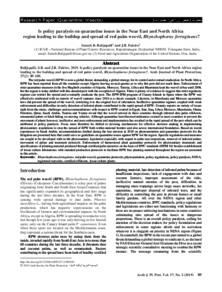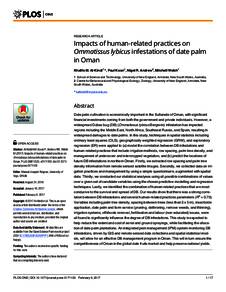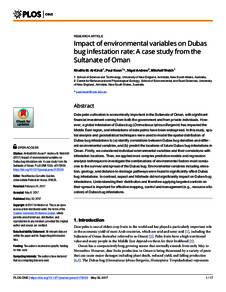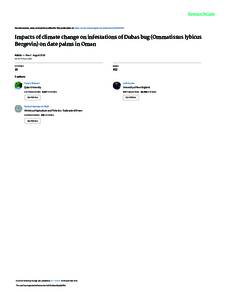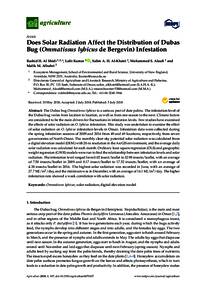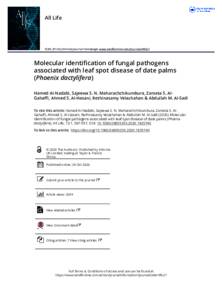Document
Is policy paralysis on quarantine issues in the near east and north Africa region leading to the buildup and spread of red palm weevil, rhynchophorus ferrugineus?.
Identifier
DOI: 10.22268/AJPP-037.2.089100
Source
Arab Journal of Plant Protection. v. 37, 2, p. 89-100
Contributors
Faleiro, J. R., Author
Country
Lebanon.
Publisher
Arab Society for Plant Protection.
Gregorian
2019-01-01
Language
English
Subject
English abstract
The red palm weevil (RPW) is now a global threat, demanding a global strategy for its control and eventual eradication. In North Africa, RPW has been reported from all the countries except Algeria leaving several queries as to why this pest did not reach there. Enforcement of strict quarantine measures in the five Maghreb countries of Algeria, Morocco, Tunisia, Libya and Mauritania kept the weevil at bay until 2008, but the region is today riddled with this dreaded pest with the exception of Algeria. There is plenty of evidence to suggest that strict regulatory regimes can restrict the spread and eventually eradicate the pest. The RPW-IPM program of Canary Islands in Spain where the RPW was effectively eradicated with no reports of weevil captures since 2016 is a classic example. Likewise, in Mauritania and Morocco quarantine laws did prevent the spread of the weevil, restricting it to the original foci of infestation. Ineffective quarantine regimes coupled with weak enforcement and difficulties in early detection of infested plants contributed to the rapid spread of RPW. Country reports on variety of issues right from the status, challenges and recommendations with respect to RPW control in Egypt, Iran, Iraq, Libya, Morocco, Mauritania, Oman, Palestine, Qatar, Saudi Arabia, Tunisia and Yemen reveal that the weevil arrived in these countries through infested date palm offshoots, ornamental palms or hitch hiking on moving vehicles. Although quarantine laws/decrees/ordinances existed in most countries to prevent the movement of plants however, ineffective and poor enforcement and implementation has resulted in the rapid spread of the pest which can be attributed to policy paralysis. Focus must therefore be shifted to devising mechanisms for effective decision making in implementing phytosanitary regulations to stop the spread of RPW both within national borders and also across international boundaries. Based on recent experiences in Saudi Arabia, recommendations drafted during the last mission in 2018 on phytosanitation and quarantine protocols for the Kingdom are presented here that could serve as guidelines on quarantine issues against RPW for the region. Specific regulations and measures are sought to be developed with in the phytosanitary legislation especially with regard to palm tree inspections, removal of infested palms, movement of palms and treatment protocols. Enforcement of harmonized plant quarantine protocols for phytosanitary treatments and specifications of planting material produced through certified palm nurseries on the basis of IPPC standards (ISPM 36) besides establishment of tissue culture laboratories with standard production protocols to facilitate RPW free planting material throughout the region are presented in this article.
ISSN
0255-982X
Category
Journal articles

